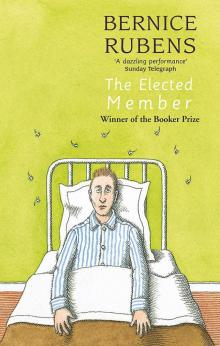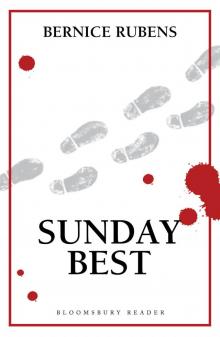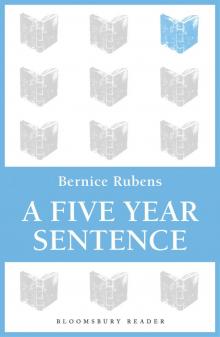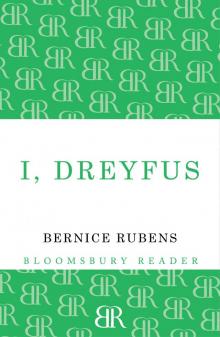- Home
- Bernice Rubens
The Elected Member
The Elected Member Read online
Norman is the clever one of a close-knit Jewish family in the East End of London. Infant prodigy; brilliant barrister; the apple of his parent’s eyes… until at forty-one he becomes a drug addict, confined to his bedroom, at the mercy of his hallucinations and paranoia.
For Norman, his committal to a mental hospital represents the ultimate act of betrayal. For Rabbi Zweck, Norman’s father, his son’s deterioration is a bitter reminder of his own guilt and failure.
Only Bella, the unmarried sister, still in her childhood white ankle socks, can reach across the abyss of pain to bring father and son the elusive peace which they both desperately crave.
SPHERE BOOKS LTD
Published by the Penguin Group
27 Wrights Lane, London W8 5TZ England
Penguin Group (USA) Inc., 375 Hudson Street, New York, New York 10014, U.S.A.
Penguin Group (Canada), 90 Eglinton Avenue East, Suite 700, Toronto, Ontario, Canada M4P 2Y3 (a division of Pearson Penguin Canada Inc.)
Penguin Group (Australia), 250 Camberwell Road, Camberwell, Victoria 3124, Australia (a division of Pearson Australia Group Pty Ltd)
First published in the Great Britain by Hamish Hamilton Ltd, 1983
Published by Sphere Books in 1986
Copyright © 1969 by Bernice Rubens
All rights reserved
ISBN: 0-349-1302-21
PUBLISHER’S NOTE
This is a work of fiction. Names, characters, places, and incidents are either the product of the author’s imagination or are used fictitiously, and any resemblance to actual persons, living or dead, business establishments, events, or locales is entirely coincidental.
CIP data available upon request
Except in the United States of America, this book is sold subject to the condition that it shall not, by way of trade or otherwise, be lent, resold, hired out, or otherwise circulated without the publisher’s prior consent in any form of binding or cover other than that in which it is published and without a similar condition including this condition being imposed on the subsequent purchaser.
The scanning, uploading, and distribution of this book via the Internet or via any other means without the permission of the publisher is illegal and punishable by law. Please purchase only authorized electronic editions, and do not participate in or encourage electronic piracy of copyrighted materials.
Your support of the author’s rights is appreciated.
Cover illustration by Ashley Potter
FOR RUDI
Also by Bernice Rubens
BIRDS OF PASSAGE
BROTHERS
A FIVE YEAR SENTENCE
1 SENTA TOMYLOVE
MADAME SOUSATZKA
MR WAKEFIELD’S CRUSADE
THE PONSONBY POST
SPRING SONATA
SUNDAY BEST
Table of Contents
Chapter 1
Chapter 2
Chapter 3
Chapter 4
Chapter 5
Chapter 6
Chapter 7
Chapter 8
Chapter 9
Chapter 10
Chapter 11
Chapter 12
Chapter 13
Chapter 14
Chapter 15
Chapter 16
Chapter 17
Chapter 18
Chapter 19
Chapter 20
About the Author
Chapter 1
Norman Zweck dared not open his eyes. He turned over on his stomach, raised his knee high, stiffening straight the other leg. He slipped his toe into the division of the two mattresses, savouring the chill of the other side, the inherited side. Once it had been his parents’ bed. a vast seven-footer, mahogany.
joined at both ends for form’s sake, but divided in the middle for all practical purposes. Together but divided, they had lain for the forty-five years of their marriage.
When his mother had died, two years before, she had, On that very bed, but on the other side, bequeathed it to him.
His father had gladly taken over his son’s single bedroom, while Norman lay chained to his inheritance. Occasionally.
he had slipped over to his cold legacy during his fitful sleeps. But nightmares awaited him on that side, and terrible wakenings. He edged over for safety to his father’s side, stiffening again his one leg, and embedding his other foot into the dividing line, and without touching his body, he felt the feel of it. A young boy, he thought, would have felt the same sensation in the youthful stretch of the leg, and the relaxed hollow between the shoulder blades. So he did not touch the folds on his stomach, or the veined stretches of his groin. These were intellectualised realities, and had nothing to do with the teen-age lay-out of his body.
He slipped his hand underneath the pillow, grazing his stubbled cheek. He smiled sadly at this undeniable touch of age, and to confirm it, grasped with his calloused hands, the wrinkled folds of his flesh. He gathered them up, one by one, the muscle-less wads on his belly, his chin and his thighs, twisting and turning them, obsessed by their feel of years. He returned to his original lay-out, but now he knew it for a fraud. The folds and wrinkles on his skin, were notches, each one, for each of his forty-one years.
He screwed his eyes tightly against the dark. He knew that his short sleep was over, but he was too terrified to acknowledge it. He should never have let himself doze off.
God knows what they were doing while he was sleeping, and God knows what they were doing now, and where else they were, and how many. No, he would not open his eyes.
If they were still there, he could rely on them to stay. He pulled the pillow over his ears. He didn’t want to hear them either. Yet he wanted to check that they were still there. He dreaded their presence, but their sudden absence would have terrified him more. They were the only witnesses to his sanity.
He opened his eyes, first to the darkness under the pillow, and then to the darkness in the room, and it frightened him. He got up and groped for the light, and squinting, quickly returned to his blanket cocoon. Slowly, he adjusted his eyes to the light, and he lay there, staring at his legacy on the other side. He felt a stinging behind his eyes as a prelude to tears and it surprised him. He had plenty to cry about, but he had never given in to any feeling of self-pity. Quite often, he had thought to put an end to it all, but he had to convince somebody, at least one person before he went, otherwise, in their eyes, he would die a madman. But nobody would listen to him any more.
Nobody believed him. Nobody had the willingness the patience to sit with him for a while, if necessary for hours, and see them like he saw them, and catch a little of his fear.
He stroked the virgin sheet alongside him, over and over again. And suddenly on the skin of his palm, he felt the grazing of a curve and a line. As he lowered his hand, he uncovered, as in a brass rubbing, the head, shoulders and prone body of his mother. His hand lay paralysed where her legs would lie, and terrified, he clawed down the sheet and revealed her entire. As he stared at her, he felt ice-cold tears blotting the fire on his cheeks. He opened his mouth to call her, but refrained. He didn’t want to acknowledge her presence. He told himself it was a nightmare. But perhaps the other things were nightmares too, perhaps there was nothing in the room, save his own tormented soul in its worn and wrinkled packaging.
Perhaps it was all a hallucination. ‘No,’ he screamed into the sheets. Not that word. Not that filthy rotten family word, that his father and his sister had picked up from his psychiatrist. They were blind, all of them, and they tossed the word at each other knowingly yet shamefully, comforted by its overtones of impermanence. He’s hallucinating,’ they would nod at each other, and he could have killed them for their cosiness.
He stared a
t his mother again. She was there, sure enough, and so were all the other things. She would have seen them. She would have acknowledged them and got rid of them. She would have delivered him. ‘Mama,’ he whispered, but the curve and line dissolved into the sheet.
Even he saw that she was gone, and over the years he had become an expert in the appearance and disappearance of things. But he knew she would come again, and he lay in wait for her, his cold hand spread over the sheet.
He lifted his ear from the pillow and he heard them, the scratching teeth-gnashing grind of their crawl. And something new too. Their smell. At first, he held his breath, then he sniffed gratefully around him. A dewy smell, like biscuits left uncovered, to soften. It was further proof that they were there. They had a right after all, to make a noise and to emanate some kind of odour. But he was frightened too. Each further proof of their presence frightened him.
The more overwhelming the evidence, the less credulous his family became. He buried his head in the pillow, clasping his body with his hands. Slowly his fingers moved, scratching along the flesh of his shoulders. He tried to ignore what his fingers were doing, and he began humming a tune to give his fingers some excuse for drumming on his back. But his fingers ignored the rhythm, scratching in spasmodic frenzy all over his body. He started to sing loudly, but his fingers refused to accompany him. Then, beaten, he buried his head in the pillow, and acknowledged that they were on him. They were crawling on his back, sponging the sweat that trickled down his spine, loitering on his hip-bone. and sliding slimy into his groin.
He leapt out of bed, grabbing the pillow, and ran through the darkness into the bathroom. He threw the pillow into the bath and dowsed it with boiling water. He knew they were in the pillow, alive and therefore killable. He took a of Dettol from the cupboard and slopped it over his body. He would entertain them as long as they were on the floor and window-sills, but on his body, never. He had to teach them to know their place. That much he had to control. Why then, he wondered, could he not wipe them dean from the floor as he intended to do from his body.
Perhaps they didn’t exist at all, anywhere. He caught the shadow of his face in the mirror above the sink. He did not recognise the image that stared back at him, and he clenched his fist at it, and screamed, ‘Are you going mad?’ and sobbing he shuffled back to his room to greet them.
He turned off his light, and avoiding the bed, groped his way to their accustomed hang-out around the fire-place.
He reached for his torch on the mantelpiece and shone it obliquely towards one corner of the room. As he waited he scratched himself with his free hand. He hoped that the bites and their scars were visible. It would be undeniable proof to his father. The smell was overpowering, but he wallowed in it. That too, was proof. His father would come in the morning to waken him, and he would have to notice it. Until then, he would sit and watch them, and try to overcome his fear.
They did not keep him waiting long, because he was congregated and wriggled. A swarm of twisting silver fish, as he had seen them every day and night that he could remember, for the days and nights he had forgotten had been erased by his madness. He shifted the beam of the torch over to his right, teasing the insects to another halt.
In such a manner, Norman Zweck perambulated his flock around the fire-place through the lightening dark, that soon cancelled out the torch. Then suddenly they disappeared. Norman curled himself up by the fire-place, staring, sniffing and scratching, hanging on the smell of them and the feel of them, and searching for their traces along the worn rug by the fire. He always dreaded this hour of the day, when the light drove them into obscurity and he was left with only the memory of their creeping promenade. It was now that fear invaded him fully, and the dread question that he had managed to hurl at the man in the bathroom mirror. He watched the globules of sweat as they grew full and exploded on his arms and leg.
He indulged in his fear as it -melted his bowel, sauntered over his thighs, and lodged in the bend of his knees.
‘They’re here,’ he whispered to himself, ‘I see them, I smell them, I scratch them on my flesh.’ He clutched his into his arms, embracing his despair. Then with the conviction that only a lunatic can achieve, he shrieked aloud, ‘I know they are here.’
He crawled onto the foot of the bed, rubbing his itching flesh against the raw blanket. When morning came, he was asleep, and had his father known of his son’s night, he would not have woken him.
Chapter 2
But at eight o’clock, as was his custom, Rabbi Zweck came into Norman’s room to wake him. He hesitated as he saw him crumpled at the foot of the bed, but he did not allow the position to unnerve him. His son had had a restless night, a bad dream maybe; everybody did from time to time. Even when the smell of Dettol hit him, he tried to dismiss its known associations. He tapped his son gently on the shoulder. ‘Norman,’ he said, ‘is eight o’clock.’
Norman responded immediately, and as he raised his head, he saw his father sniffing around the room. He jumped off the bed, wild with gratitude. ‘You can smell them?’ he said.
Rabbi Zweck turned pale. It was starting all over again. This was the fifth breakdown in less than a year. ‘Dettol, I smell,’ he shouted angrily. ‘That’s what I smell. Dettol.’ His anxiety exploded inside him with automatic anger at the mad. ‘Nothing to smell,’ he screamed at him again, only Dettol. Get up meshuggana. Breakfast is ready.’ Rabbi Zweck slammed the door. He doubted whether he could survive if Norman collapsed again. He heard the key tum in his son’s door and the sound sickened him. As he stood outside the kitchen, he shuddered at his own loneliness, but the sense of his son’s isolation behind the locked door, almost killed him.
Norman waited for his father’s slippered tread to die away. Then he got down on his knees, and scrambled at a loose floorboard underneath the bed for his day’s supply. Wedged under the board was an old cardigan, and from its wrapping he extracted a large bottle. He held it up and looked at its level. He was frightened that it was so low. He had bought the bottle only a week ago, and he panicked at the thought of getting money for more. He poured a handful into his palm, remembering the old days, years ago it seemed, when he’d tentatively taken just one.
He stuffed them into his mouth hurriedly, screwing on the cap at the same time. He replaced the floorboard, and got shakily to his feet. Then quietly he unlocked his door and opened it. He heard the whisperings of his father and sister in the kitchen. They thought he was mad. Oh not that. That couldn’t happen in their family. He was just being perverse. He was breaking their hearts for want of something better to do. It was not his agony. It was theirs.
‘Silver-fish,’ he heard his father muttering, ‘again with his silver fish. Whoever heard of fish crawling on a carpet? Water they need. But no. My son’s fish, such a clever son I have, on carpets they can live, in pillows, in sheets. Insects, he calls them. Fish are fish,’ he yelled at his daughter as if she were denying it. ‘On the carpet they should be.
'Huh.'
‘Shut the door, for heaven’s sake,’ he heard Bella whisper, and he knew that they had begun to conspire against him. He did not bother to wash or dress. He wanted to interrupt their plotting. He threw on a dressing-gown, and tip-toed to the kitchen. Then suddenly he burst open the door. His sister stopped mid-sentence, and began to fuss over his place at the table. As he came over to sit down, she started sniffing at him.
‘Can you smell something?’ he asked with waning optimism.
‘Dettol she smells,’ his father jumped in to answer for her.
‘They’re all over the place,’ he threatened them. ‘They’re on my body too. You must be a couple of blind insensitive bastards if you can’t see them.’ Although vulgarity always accompanied Norman’s hallucinations, Rabbi Zweck could never get used to it. In the rare intervals of his son’s sanity, and the accompanying good relations between them both, he forgot the crudity, he forgot the belligerence, and when they appeared, it was always as if for the first time. He looke
d across at his son, forcing himself to remember the boy’s innate gentleness. It was not his son who was rambling on about his silver-fish; it was some devil that possessed him. Some evil eye in temporary lodging. And when he saw his son as one possessed, Rabbi Zweck found it easier to forgive him. He stretched out his hand over the table, and covered his son’s with his own. Norman snatched his hand away. ‘I’m going to ring up the Health Authorities.’
‘Again?’ Bella said wearily. ‘They came,’ she tried to be patient with him, ‘they came two months ago. They went through the house with a They took away samples you gave them. They tested them in laboratories.
All they found was carpet fluff and dirt. You had their letter. In black and white. What more d’you want?’
‘They were here for five minutes,’ Norman shouted at her. ‘What did they expect to find in five minutes? They’ve got to pull up the carpets and do it thoroughly. Don’t you bloody well care,’ he shouted at them, that you’ve got them crawling all over the place?’
‘Eat your breakfast,’ his father said gently.
Norman tapped his father’s arm and grinned at him. ‘I bet you’ve got them all over your body too.’
It was the grin that finished Rabbi Zweck. During his son’s breakdown, he often had the feeling that Norman was having him on. That he was just driving him mad for the kick of it. ‘you think you are so funny,’ he shouted at him. and he slapped Norman’s cheek with the back of his ringed hand.

 The Elected Member
The Elected Member Sunday Best
Sunday Best Nine Lives
Nine Lives Madame Sousatzka
Madame Sousatzka A Five Year Sentence
A Five Year Sentence I, Dreyfus
I, Dreyfus